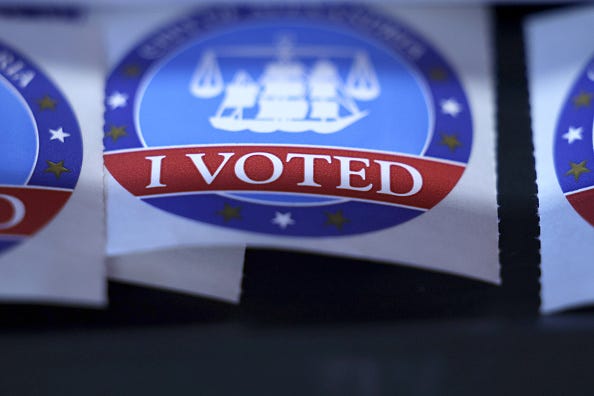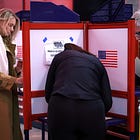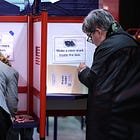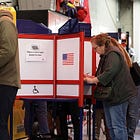From 'ICE Out' to 'Wyatt Earp': What Alexandria voters wrote in for sheriff
In an uncontested race, nearly 2,000 Alexandria voters used write-ins to protest, joke, or imagine alternatives
Incumbent Sean Casey ran unopposed for Alexandria Sheriff in the November 4 election, securing the position with 49,276 votes. But 1,912 Alexandria voters—3.7% of all votes cast—chose to write in someone else entirely, transforming an uncontested race into an unexpected window on voter sentiment about law enforcement.
The write-in ballots reveal a mix of protest votes, pop culture references, and personal choices that offer insight into how Alexandria voters engage with down-ballot races when presented with no alternative on the ballot.
The high write-in rate came amid ongoing controversy over Casey’s practice of transferring inmates to Immigration and Customs Enforcement custody in response to administrative warrants—a policy that drew residents to pack city council chambers in October demanding the sheriff stop cooperating with ICE.
The protest vote
Several Alexandria voters used their write-ins to express opposition to Casey’s cooperation with Immigration and Customs Enforcement—an issue that had dominated local politics in the weeks before the election.
The starkest example: One ballot read “Casey collaborater with ICE,” a direct criticism of the sheriff’s practice of transferring inmates to ICE custody in response to administrative warrants.
At least one voter wrote “ACAB”—the acronym for “All Cops Are Bastards,” a slogan associated with police abolition movements.
Another wrote simply “ICE Out,” echoing the name of the advocacy group ICE Out of Alexandria, which organized public protests in October demanding Casey stop ICE transfers.
“Any Republican” appeared on at least one ballot, suggesting a voter who viewed the race through a partisan lens despite its officially nonpartisan nature.
The ICE controversy had reached a boiling point just weeks before the election. According to speakers at an October city council hearing, Casey transferred 40 people to ICE custody through August 2025, with 35 transfers in the first half of the year alone. Sheriff’s office data showed transfers had increased from 11 in 2021 to 43 in 2024.
Casey has maintained his office follows Virginia law and only transfers inmates “on their scheduled release date, provided ICE has filed a lawful arrest warrant.” He has said the practice does not constitute “collaboration” with ICE.
On November 12—eight days after the election—Alexandria City Council issued its first unified public statement on the issue, calling on Casey to “cease his transfer of persons in his custody in response to ICE administrative detainers and warrants.”
The timing suggests the write-in protest votes may have been an early signal of voter discontent that crystallized in the council’s eventual action.

Pop culture and historical figures
When given a blank slate, several Alexandria voters turned to entertainment and history:
Western lawmen:
Wyatt Earp (legendary Old West lawman)
Roscoe P. Coltrane (the bumbling sheriff from “The Dukes of Hazzard” TV show)
Entertainment figures:
Dolly Parton (written as “Delly Parton”)
National political figures:
Donald Trump / Donald J. Trump (appearing multiple times)
Actual law enforcement professionals
Some write-ins appeared to be genuine suggestions of real law enforcement figures:
Grady Judd — The long-serving sheriff of Polk County, Florida, known nationally for colorful press conferences and tough-on-crime stances
William C. Cleveland
Alphonse L. Sutton
These choices suggest some voters took the opportunity to nominate sheriffs they admired from other jurisdictions.
Personal names
The majority of write-ins appear to be personal names:
Carolina Guiral
Matthew Rystrom
Andy Clark
Tyler Martinez
Elsie Sykes
These likely represent friends, family members, or community figures the voters wanted to recognize—or perhaps people they genuinely believed would make good sheriffs.
At least one voter simply wrote “ur dad.”
Rejection votes
Many Alexandria voters used their write-in to explicitly reject the premise of voting:
“N/A” (appearing multiple times)
“NONE”
Blank write-ins (bubble filled but no name written)
Miscellaneous and unclear
Several write-ins were difficult to decipher or unclear:
“ABE CABBE”
“Bidu”
Voting Methods
The 1,912 Alexandria write-ins for Sheriff came through:
676 in early voting
1,032 on Election Day
152 by mail
35 provisional
17 post-election
More than half of write-in voters (54%) cast their ballots on Election Day, compared to Casey’s voters, where only 50% voted on Election Day. This suggests write-in voters may have been more likely to be spontaneous or last-minute decision makers.
What It Means
The write-in patterns in this uncontested race reveal several dynamics:
Protest voting when no alternative exists: Unlike contested races where dissatisfied voters can choose the opposition, voters facing an unopposed candidate must either skip the race entirely or use a write-in to voice opposition. The protest votes—especially those mentioning ICE—suggest meaningful dissatisfaction among some voters with law enforcement policies.
Significant engagement despite futility: That 1,912 voters took time to write in names when they knew it wouldn’t change the outcome indicates these voters remained engaged even in races with predetermined outcomes. At 3.7% of total votes, this is a notably high write-in rate for an uncontested race.
Humor as civic participation: The pop culture references and joke candidates suggest some voters saw the write-in option as an opportunity for self-expression rather than a serious vote.
The “uncontested” paradox: While legally uncontested, the race generated significant write-in activity. If even a fraction of these write-ins had coalesced around a single alternative candidate who registered as a write-in, they could have made a statement—though still unlikely to win.
Virginia Write-In Law
For a write-in vote to count toward a candidate’s official total in Virginia, that person must register as a write-in candidate with the state before the election. Since none of these write-in candidates registered, their votes are tallied and recorded but don’t affect the official outcome.
The votes are preserved in these write-in assignment documents for transparency and to comply with state election record-keeping requirements.
METHODOLOGY NOTE: This analysis is based on my review of Alexandria’s official write-in assignment document from the Nov. 4, 2025, general election for Sheriff, which contains images of write-in ballots requiring adjudication.
The document shows 1,899 ballot images across 147 pages. The official results show 1,912 total write-in votes, with the 13-vote difference likely representing write-ins that were clearly legible and didn’t require adjudication review. Some handwriting was difficult to decipher, and some names may be spelled phonetically. All totals are from official Alexandria election results.





